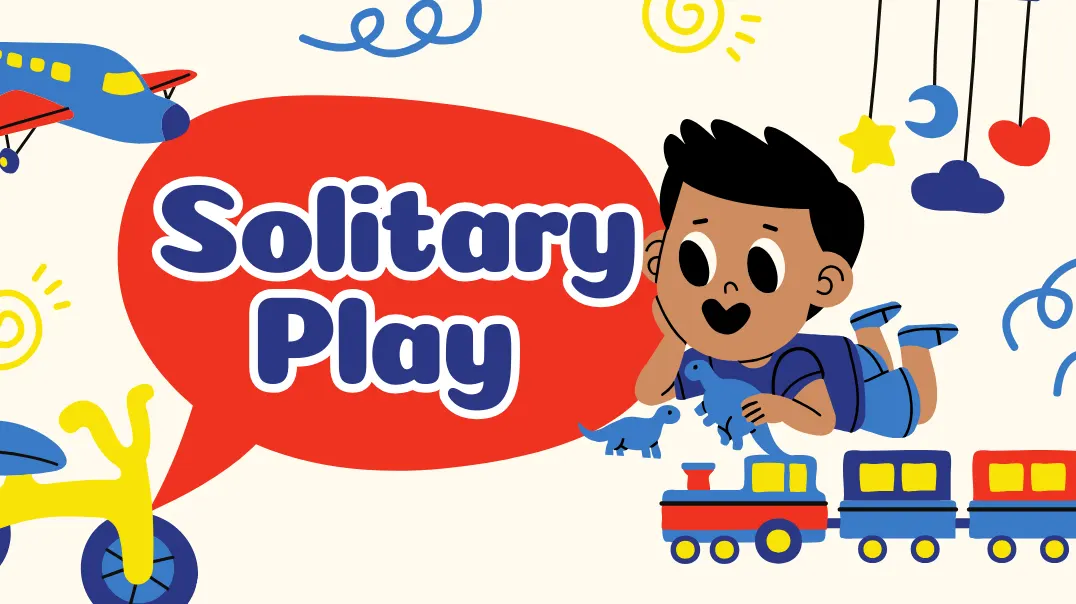Imagine your child sitting quietly in a corner, stacking blocks individually while other children laugh and play. Many parents worry when they see their children choose to play alone rather than join in group activities. They often wonder if this behavior indicates a lack of social skills or developmental issues.
If this happens frequently, concerns intensify. You may wonder if your child is shy, lacks social skills, or is developmentally delayed. Compared to the boisterous nature of group play, the quiet of solitary play can sometimes feel unsettling.
In fact, solitary play is a healthy and important part of childhood. It allows children to explore their imaginations, practice problem-solving, and gain independence—benefits that group play doesn’t offer. In this article, we’ll delve into the true meaning of solitary play, its importance, and how to encourage children to engage in it confidently and joyfully.
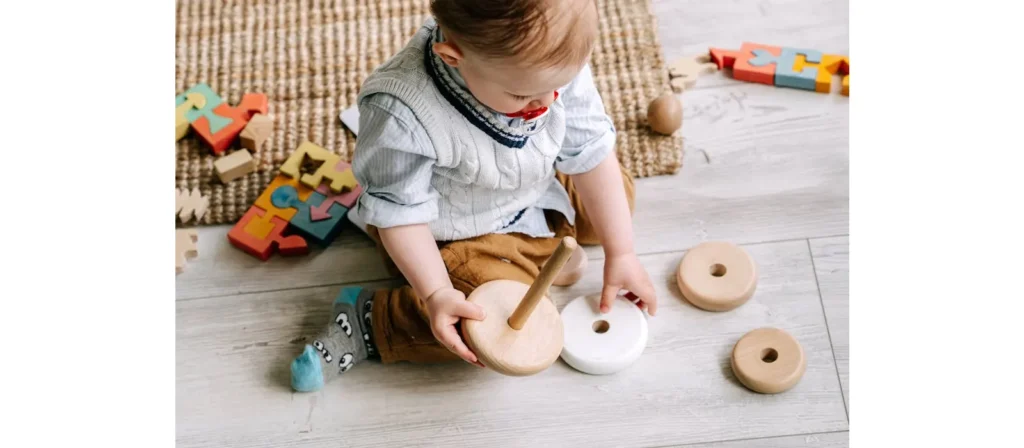
What Is Solitary Play?
Solitary Play, or independent or solo play, is a form of self-directed activity in which a child engages alone without interaction or cooperation with others. Contrary to the belief that playing alone indicates social withdrawal or neglect, Solitary play is critical to healthy child development, particularly during the early stages of life.
Solitary play is the foundation for cognitive, emotional, and social competencies from infancy to early childhood. It allows children to focus entirely on their thoughts, actions, and interactions with their environment without the complexities of social negotiations.
Solitary play often precedes any other type of interactive play and becomes more complex as children grow. It is not just a phase, but a dynamic form of learning that supports essential life skills.
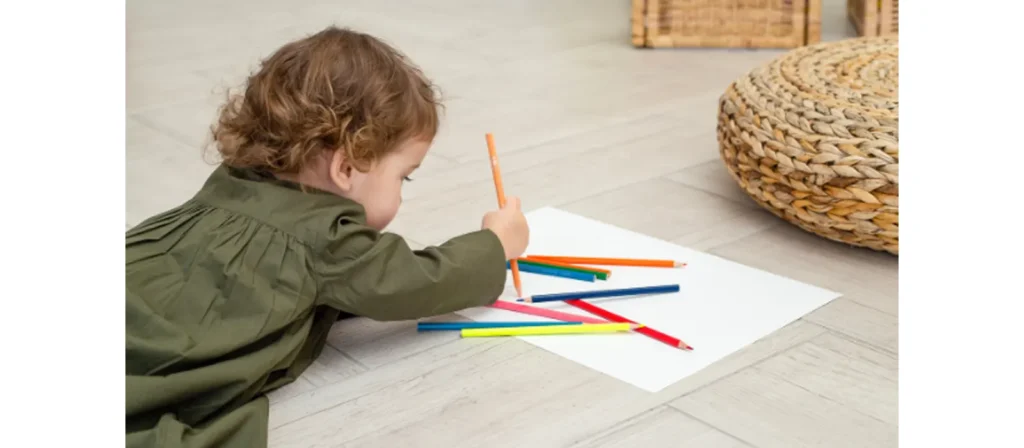
The Importance of Solitary Play
The value of solitary play goes far beyond simple entertainment. It fosters traits that contribute to long-term academic success, emotional stability, and adaptive behavior.
1. Cultivate Independence
Children learn to entertain themselves, make choices, and solve problems without relying on adults or peers. This self-sufficiency nurtures autonomy and builds a sense of competence. When children experience the ability to complete a task alone, they develop confidence that carries into other areas of life.
2. Foster Creativity and Imagination
Children playing alone are free to invent worlds, characters, and narratives. There are no rules but their own. A stick becomes a magic wand; a pillow turns into a mountain. This imaginative freedom strengthens divergent thinking and supports expressive language development. Over time, this creativity translates into better writing, storytelling, and artistic or musical pursuits.
3. Teach Self-Regulation
Solitary play teaches children how to manage their impulses, frustration, and expectations. Without the immediate presence of adults to intervene, they learn to soothe themselves, persist through challenges, and celebrate their accomplishments. These are essential traits in building emotional intelligence and coping mechanisms.
4. Promote Problem-solving Skills
Without peers or adults to assist, solo players become their own problem-solvers. They learn to adjust strategies, experiment with solutions, and cope with failure. Whether fitting a puzzle piece into the right spot or figuring out how to build a taller structure, these moments strengthen their critical thinking abilities.
The more often children engage in independent problem-solving, the more confident they become in their capabilities. A mindset that directly impacts academic and social success later in life.
5. Improve Attention
Solitary play naturally improves attention span. Unlike structured classroom activities or group play, it can proceed at a child’s pace. They can choose how long to engage, when to shift focus, and what to do next.
Solitary play is a natural antidote in a world filled with digital distractions. This autonomy often leads to deeper engagement and more extended periods of focus, especially when children are immersed in meaningful or imaginative tasks.
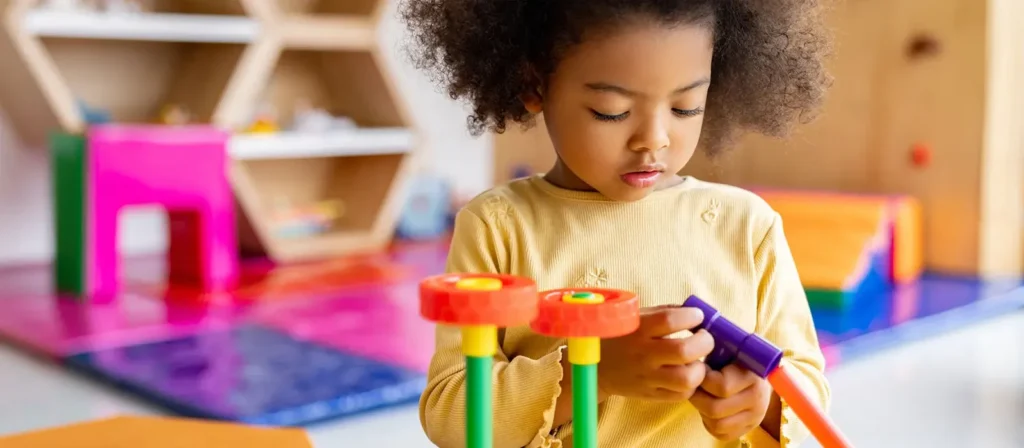
When Should Solitary Play Begin?
Solitary play begins as early as infancy. Developmental psychologists generally observe signs of solitary exploration by the time a baby is six months old. At this stage, babies begin to explore their environment through sensory engagement.
Key Age Milestones:
- 0–3 months: Babies explore their hands, feet, and movement. This is early unoccupied play—a prelude to solo exploration.
- 6–12 months: Babies begin interacting with toys, mouthing objects, and testing sensory experiences.
- 12–24 months: This is the golden age of solitary play. Toddlers start building, banging, pretending, and exploring their environment independently.
- 2–3 years: Children enjoy solitary play deeply but may begin to notice others. Parallel play (playing side-by-side) emerges but doesn’t replace.
- 3+ years: While children engage more in social play, solo play remains essential for personal space, creativity, and focus.
While solitary play emerges naturally, its duration and complexity expand with development. Early encouragement and the right environment can significantly influence a child’s willingness and ability to engage in solo activities for extended periods.
Examples of Solitary Play
Solitary play can take many forms. Here are some specific examples seen in both home and classroom settings:
- A child stacking wooden blocks to create towers and bridges
- Drawing shapes and doodles with colored pencils
- Pretending to feed a stuffed animal
- Pouring water between two cups in a sensory station
- Flipping through a picture book and narrating the story
- Matching objects by color, size, or shape
- Engaging in pretend play using toy kitchen sets
- Exploring musical instruments like tambourines or xylophones
- Constructing with magnetic tiles or LEGO bricks
- Solving wooden puzzles or completing matching cards
These activities engage children and promote specific developmental outcomes like motor coordination, vocabulary building, and emotional expression.

How to Encourage Solitary Play in Children?
Encouraging solitary play is not about pushing a child to be alone. It’s about providing the right environment and knowing when to step back. Here are five practical strategies:
Provide Appropriate Toys
Toys that encourage open-ended play are best for independent play. Building blocks, art supplies, dolls, play kitchens, puzzles, and books encourage creative thinking and focus.
Avoid stimulating, noisy, or overly digital toys, as these can limit a child’s imagination or encourage passive consumption. Choose toys that promote manipulation, exploration, and invention.
Allow Children to Play Alone
Sometimes, well-meaning adults interrupt play to offer help or join in. While shared play has value, it is important to give children uninterrupted time to engage independently. Resist the urge to direct or correct unless safety is involved.
Letting them “figure it out” teaches patience and problem-solving.
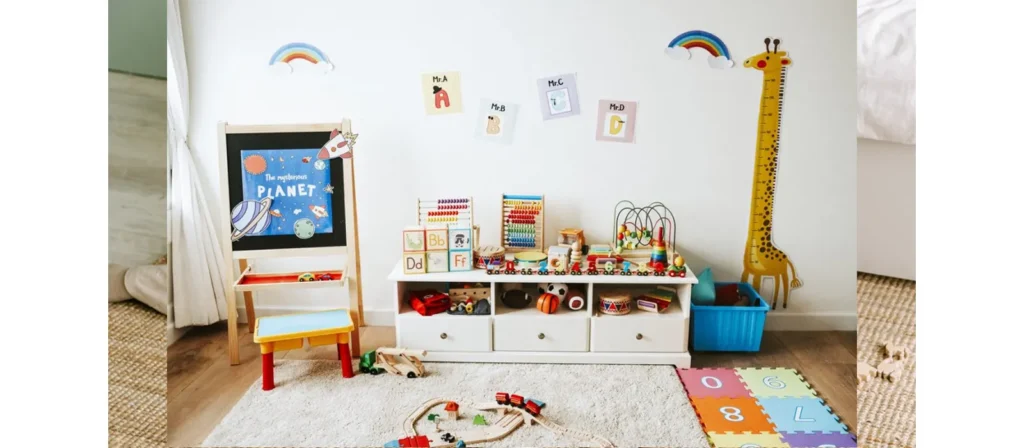
Create a Free Play Area
Designate a safe, quiet, and fun space in your home. Low shelves, soft rugs, and natural light can make a big difference. Children should be able to reach items independently and know where everything is.
Do Not Disturb Children
Respect their flow state. If they’re quietly focused on a task, let them be. As we dislike being interrupted during deep work, children deserve the same respect during solitary play.
Respect Their Choices
Solitary play often leads to unexpected outcomes. Maybe a child wants to build a “cave” out of chairs and blankets. Go with it. Support their creativity and avoid redirecting unless safety is a concern.

Potential Problems of Focusing Exclusively on Solitary Play
While Solitary play offers numerous benefits, an exclusive focus without balancing social interaction can lead to specific developmental concerns.
Causes Loneliness
Solitary play is beneficial in moderation, but extended periods of isolation may lead to feelings of loneliness. Children are inherently social beings. Although independent activities help them become self-sufficient, they still require meaningful connections with others to feel emotionally supported and understood.
When a child consistently prefers being alone and avoids social interaction, it could signal emotional distress or social anxiety. Caregivers should observe the child’s behavior patterns over time to ensure that solitary play is a choice, not a symptom of deeper issues.
Risk of Social Skill Development Regression
Children need peer interaction to develop skills like sharing, empathy, and negotiation. Overemphasis on solitary play can delay these important social competencies, especially during preschool and early school.
Reduces Cooperation
Teamwork is a life skill that begins in early childhood. Children who rarely engage in group projects, cooperative games, or peer problem-solving may struggle later in life, especially in school and professional environments.
Impacts on Mental Health
In some cases, consistent preference for solitary play may signal underlying issues like anxiety, sensory processing difficulties, or developmental disorders such as autism spectrum disorder (ASD). While solitary play is not harmful, avoiding all social interaction may require deeper evaluation.
Signs of concern include:
- Avoidance of group activities, even when invited
- Repeated rejection of peers’ or family members’ attempts to interact
- Expressions of sadness, boredom, or frustration during play
- Obsessive or highly repetitive behaviors during solitary activities
If these patterns emerge, it’s important to consult a pediatrician, child psychologist, or developmental specialist for evaluation and support.
FAQs
- At what age is it appropriate for solitary play to begin?
Solitary play can begin as early as six months old. Infants naturally engage with their surroundings and explore objects independently during this time. - How long should solitary play last for toddlers?
Toddlers may engage in solitary play for 10 to 30 minutes, depending on age, interest, and temperament. With consistency and encouragement, this duration can increase gradually. - What are the best toys for encouraging solitary play?
Open-ended toys like blocks, dolls, art supplies, puzzles, and books foster creativity and independence during solitary play. - How can I tell if my child’s solitary play is healthy?
If your child engages happily, explores creatively, and still participates in some social activities, their solitary play is likely a healthy part of balanced development. - Can solitary play help with anxiety or stress in children?
Yes, it can be very calming. Solitary play allows children to process emotions, reduce overstimulation, and feel in control of their world.
Abschluss
Solitary play is an invaluable part of childhood development. It fosters creativity, builds emotional resilience, improves attention, and encourages children to become independent learners. Through uninterrupted exploration, children develop a sense of agency that will benefit them in school, relationships, and life.
However, like all aspects of development, balance is key. While Solitary play teaches autonomy and imagination, social play nurtures empathy and cooperation. Children thrive when given the space to enjoy both.
As caregivers, parents, and educators, our goal should not be to prioritize one over the other but to create an environment where both can flourish. Encourage your child to spend time alone, dream, build, and narrate, and offer opportunities for friendship, collaboration, and shared joy.

